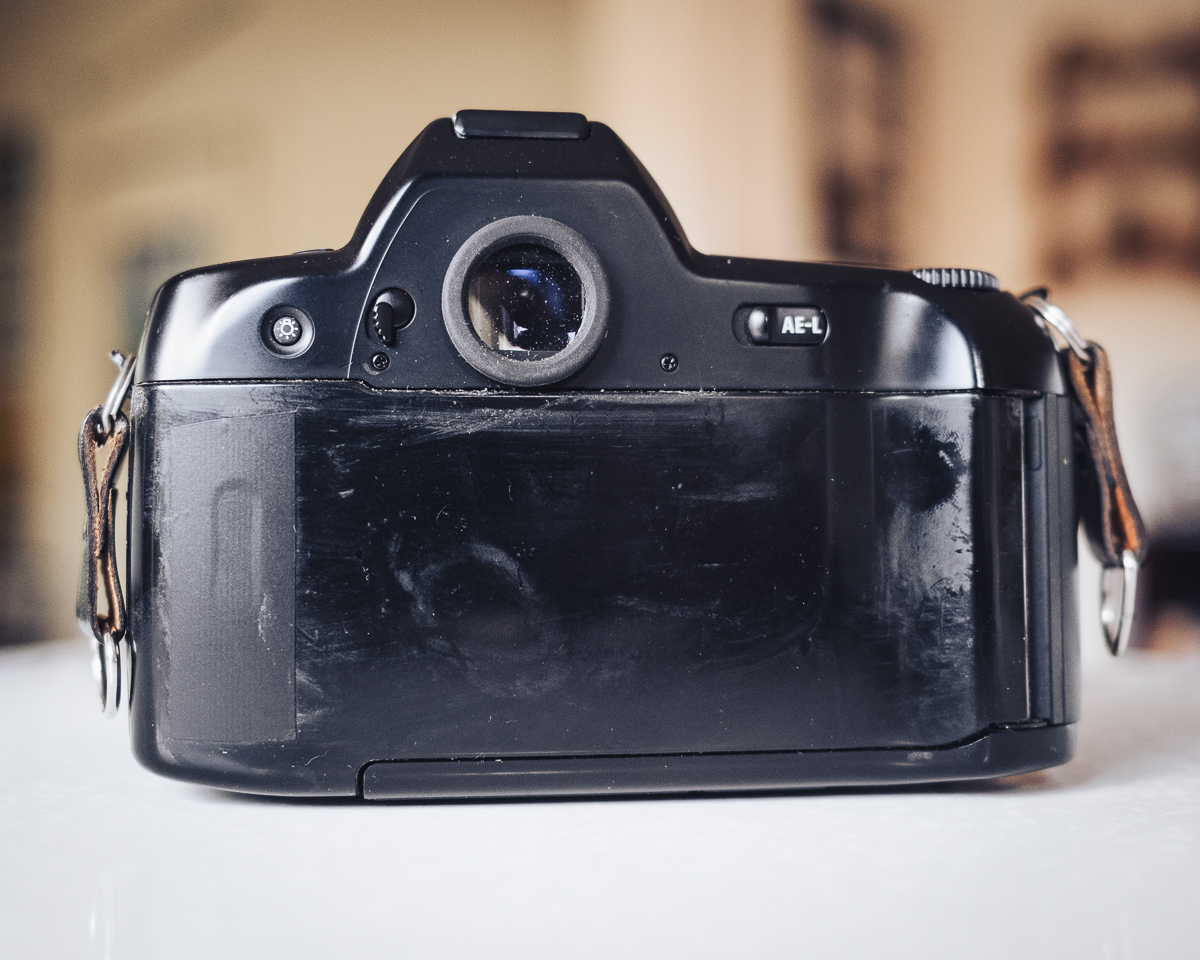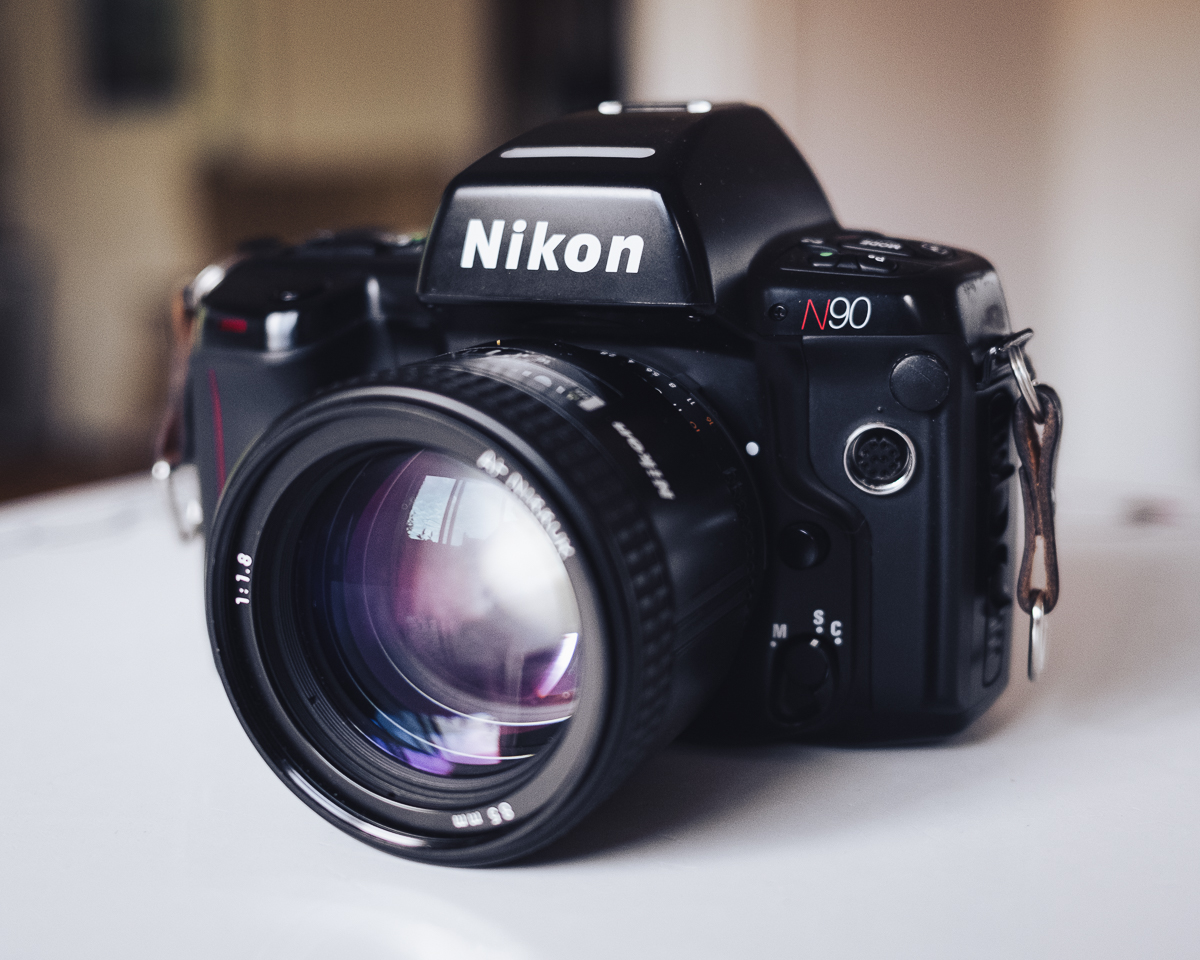Last month I stumbled upon an estate sale that had a basement absolutely chock-full of old cameras and lenses. I bought a dozen or so cameras, one being this Nikon N90. With it, I also grabbed a Nikon 85mm f/1.8 D series lens.
The N90 originally came out in 1992, and was positioned directly below the then Flagship F4 model in Nikon's line. It was touted as a professional's camera, boasting even better autofocus performance than its big F4 brother.
The N90 is a solid camera with a decent heft to it (nearly two pounds without a lens). Its build features a lot of plastic, but it still feels robust. If you're a fan of late 80's or early 90's aesthetics, then you'll love the look of this camera. It has a comfortable deep grip, and balances nicely with chunky primes like the 85mm f/1.8. Overall it's definitely premium, though obviously a step down from the metal monster that is the top of the line F4. One thing to note about the N90 is how the grippy material on the film compartment door turns to gross goop with time. Every N90 I've ever seen has a sticky mess covering the back of the camera. I had to wipe the back of my N90 clean with alcohol. Luckily, the front grip never seems to have this issue.
 |
| My N90 with all the goop removed from the door |
The top plate of the camera houses most of the N90's controls, where everything is straightforward and simple. The camera is turned on via a large switch conveniently placed directly behind the shutter release. If you flip the switch past "On" you will turn the camera on, and activate the camera's beeper, which will chirp happily to confirm when your subject is in focus, as well as scream bloody murder at you if the light is too low.
Most of the exposure and advance controls are on the left side of the prism. You can choose between aperture priority, shutter priority, program, and manual by holding down the mode button and turning the command dial. The ISO button lets you manually set the ISO between 6 and 6400 if you're like me and don't trust DX film coding to work with 30 year old cameras. The Drive button lets you choose your frame rate. There's single shot, 2 fps, and 3.6 fps. Now that's some b l a z i n g speed! The flash icon button switches flash modes if you have a dedicated one attached to the hot shoe.
Shutter speeds range between 30 and 1/8000 (yowza!), and are selectable with the command dial that's placed within easy access of your right thumb. There's only one command dial on the N90, and that's because aperture is only adjustable via the aperture ring on your lens. Now-traditional dual command dials weren't introduced until the Nikon F5 years later. This being the case, G lenses without an aperture ring will not work with the N90.
All important information is viewable on a handy top LCD panel. Tap the little lightbulb button to the left of the eyepiece and it even lights up with a soothing blue-green glow.
Focusing modes include single, continuous, and manual. There is no back button autofocus, so focus must always be activated by half-pressing the the shutter release, which has a nice range of motion. Autofocus is pretty accurate, but it tends to hunt a bit more than I'd like. The camera is also lets off a cacophony of whirring noises while focusing. It's loud. But, just about all my photos came out sharp, even ones I took in low light, so I guess I can't complain too much about a focusing system from 1992. The viewfinder is large, bright, and sharp, so if all else fails, manual focus is a valid option.
I took my N90 and 85mm f/1.8 with me to a little fair/concert in Skokie last month. My friend, Eli, came with me and brought his Yashica twin lens camera. He got lots of compliments on his cool classic camera, while everyone ignored my lump of 90's plastic. Alas, the N90 is not a sexy camera by any means, but it is a pretty dang good photographic instrument. It's dirt cheap today, and can be had for well under $100. Below are some photos I made with mine (the film was Ilford HP5+). Thanks for reading!











